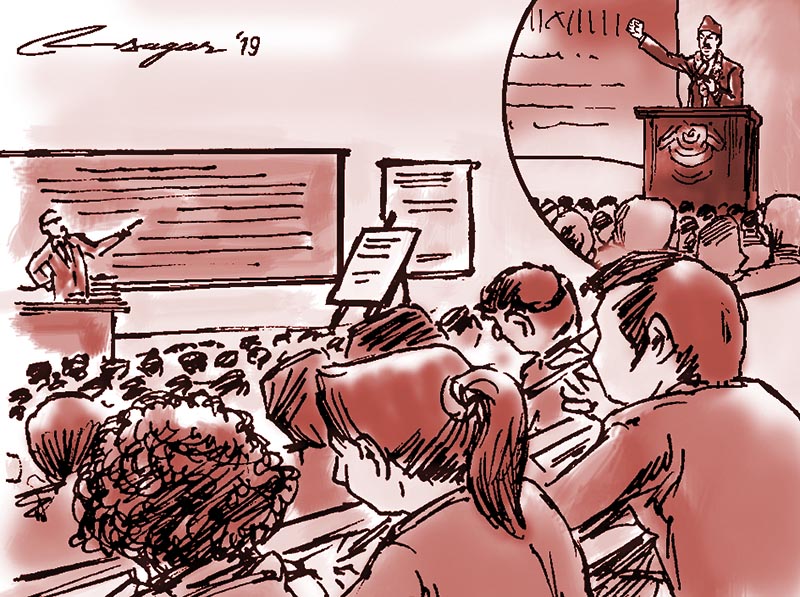Making of a good university: Keep politics at bay
The staff and students need to be evaluated on the basis of their performance, qualifications and experience rather than their political inclination. Only then will a university be approached by competitive, energetic and qualified manpower
In the very first week of me joining the Mid-Western University’s Faculty of Engineering as an assistant professor, one of the associate professors asked me, “Which party do you belong to? What is your political ideology? These are the factors that will determine whether you get something out of this university or not.” In that instance, any expectations that I may have had of him guiding me in my teaching, learning and research were nullified.
As I eventually realised, no part of the atmosphere in this university was free from political influence. To this day, when I walk through the university gates, I am reminded of the words, “What you get and what you do not get in the university depend upon political ideology and which party you belong to.” Anytime you apply for a vacancy at a given post, rather than asking about your degree and work experience, the first thing almost everyone wants to know about you is your party affiliation.
Then, the calculation, as to whose panel, theirs or the opponent’s, is more favoured, begins. This is the environment that everyone has to face in a university. Hardly anyone can be found discussing academic issues, research, new global trends and the like.
It’s shameful that people waste time discussing unnecessary things rather than uniting to solve their academic challenges so that they may develop the university into a place that offers quality higher education. But instead, we have various groups and sub-groups colluding and blaming each other.
There are some teachers who do not even teach in their daily classes but manage to finish their courses at the very last hour of the semester. Some still carry their old notes and never try to update them in their learning and teaching process. Furthermore, teachers are less motivated in research activities, and lack adequate training and international exposure.
When it comes to infrastructure, the buildings lack proper maintenance, the classrooms are not well managed and equipped, the toilets are unhygienic, there is lack of proper drinking water, and the lab rooms are dirty and dusty. Even if you look at the colleges in Kathmandu like Tri-Chandra and Amrit Science Campus, one can see such problems.
News of the corruption case filed against the Tribhuvan University (TU) Service Commission chair shocked everyone. I started to worry about the fairness of the exam for the permanent lecturer’s position that I had been preparing for, an exam that was being conducted by the Mid-Western University’s Service Commission. No one would have thought that the TU Service Commission’s head and its members would be involved in the manipulation of answer sheets to favour their relatives and friends. How will the university get qualified personnel if people with political contacts can pull strings to favour their own while putting everyone else at an unfair disadvantage?
News of plagiarised thesis reports in TU shows that research activities and journal publication are not a priority in the universities. Even students who fail the exams end up getting gold medals and certificates from the university. There are some professors who retain their positions without conducting even a single class throughout the entire semester. What is their contribution to the university and its academics and research activities? Who will take action against such professors? The students’ unions are too preoccupied squabbling among themselves over politics to take any action. University education plays an important role in the development of a nation. But with such political division between the university posts, from the vice chancellor to the campus chief, and even to the coordinator of the faculty programme, the situation is extremely difficult. How can any university progress with people distracted by politics? For a learning environment to be fair, it needs to be free from political influence. The academic and administrative environment of a university can only be improved if each and every employee feels ownership over and responsible for the growth and development of their university.
The roles and responsibilities of each employee are clearly defined in the regulations and bylaws of the university. Various committees should be instituted to monitor, evaluate and control the goings-on of a university.
Perhaps most importantly, the staff and students need to be evaluated on the basis of their performance, qualifications and experience rather than their political inclination. Then and only then will a university be approached and populated by competitive, energetic and qualified manpower. A motivated environment should be created where the students, instead of burning tires in the streets, spend their time in the library and busy themselves with research and learning activities.
The government should appoint qualified and learned academics with experience in teaching, learning activities, and who have published more research articles in journals to head university positions. Is the government incapable of conducting exams fairly even in appointing the campus chief of the colleges, free from political affiliations and obligations? If not, there will be no meaning of opening new universities in the country, as mere quantity will not work if there is no quality.
Neupane is assistant professor, Mid-Western University






